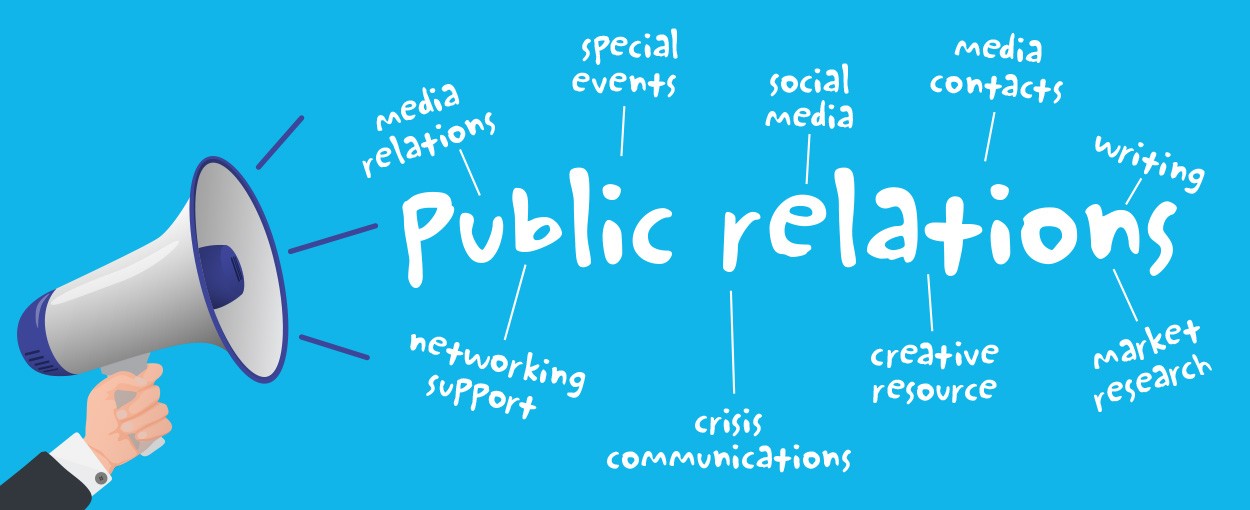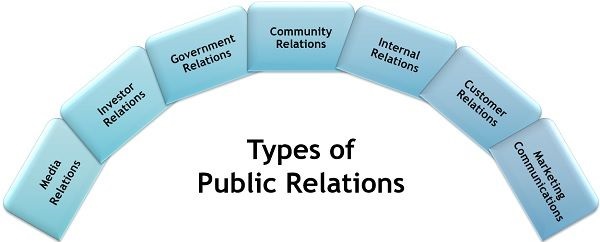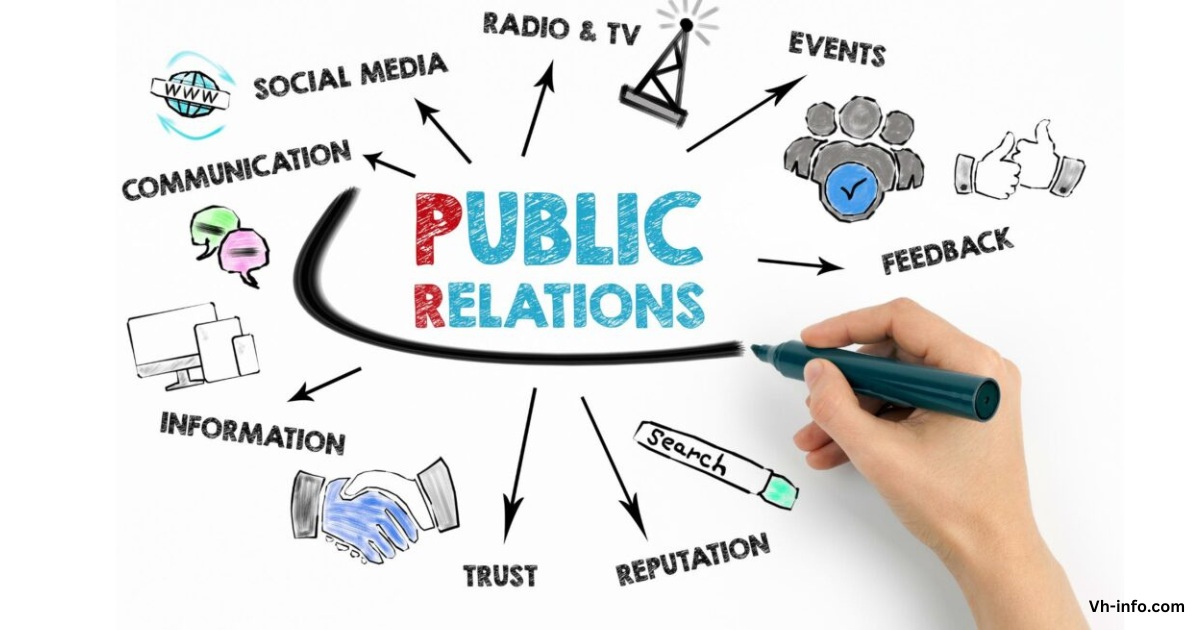In today’s fast-paced digital landscape, businesses must navigate an increasingly complex web of communication channels to reach their target audience effectively. This is where public relations (PR) comes into play as a crucial component of any successful marketing strategy.
By leveraging various PR tactics, companies can build brand awareness, establish credibility, and foster positive relationships with key stakeholders.
At VH Info, we understand the vital role that public relations play in driving SaaS link-building success. Our team of experts is dedicated to providing actionable insights and strategies to help you harness the power of PR in your marketing efforts.
In this comprehensive guide, we’ll dive deep into the world of public relations, exploring its definition, importance, and the various types of PR that can elevate your marketing game.
What is Public Relations in Marketing?

Public relations in marketing refers to the strategic communication process that builds mutually beneficial relationships between organizations and their target audience.
It encompasses a wide range of tactics aimed at managing the spread of information, shaping public perception, and maintaining a positive brand image. Unlike advertising, which involves paid promotion, public relations focuses on earned media coverage.
PR professionals work to create compelling stories and news angles that capture the attention of media outlets and influencers.
By securing positive media coverage, companies can enhance their credibility and reach a wider audience without the direct costs associated with traditional advertising
The Role of Public Relations in Marketing

Public relations plays a multifaceted role in supporting and amplifying marketing efforts.
Here are some key ways PR contributes to marketing success:
- Building Brand Awareness: PR helps companies gain visibility and recognition by securing media coverage in relevant publications and channels. By consistently generating positive press, businesses can establish themselves as industry leaders and increase brand awareness among their target audience.
- Establishing Credibility: Earned media coverage carries more weight than paid advertising in the eyes of consumers. When a trusted third-party source, such as a reputable news outlet or influencer, features or endorses your brand, it lends credibility to your products or services.
- Managing Reputation: PR professionals are skilled at managing public perception and navigating potential crises. By proactively addressing concerns, mitigating negative press, and highlighting positive aspects of the brand, PR helps maintain a favorable reputation.
- Supporting Content Marketing: PR can generate valuable content for your marketing efforts, such as press releases, thought leadership articles, and expert commentary. This content can be repurposed across various channels, including your website, social media marketing, and email marketing campaigns.
- Fostering Relationships: PR is all about building and nurturing relationships with key stakeholders, including media contacts, influencers, and industry partners. These relationships can lead to valuable opportunities, such as collaborations, event partnerships, and earned media placements.
Importance of Public Relations in Marketing

In today’s competitive business landscape, public relations has become an indispensable tool for companies looking to stand out and connect with their target audience.
Here are some reasons why PR is crucial for marketing success:
- Cost-Effective: Compared to paid advertising, public relations efforts can be a more cost-effective way to reach your target audience. By earning media coverage and leveraging relationships, you can gain exposure without the hefty price tag of traditional advertising.
- Increased Credibility: Consumers are more likely to trust earned media coverage than paid advertisements. When your brand is featured in a reputable publication or endorsed by an influencer, it carries more weight and credibility in the eyes of your target audience.
- Targeted Reach: PR activities allow you to tailor your messaging and reach specific segments of your target audience. By strategically pitching to relevant media outlets and influencers, you can ensure that your brand’s story resonates with the right people.
- Crisis Management: In the event of a crisis or negative publicity, PR professionals are equipped to manage the situation and protect your brand’s reputation. By having a solid PR team and strategy in place, you can mitigate potential damage and maintain public trust.
- Long-Term Impact: Unlike short-lived advertising campaigns, the effects of PR can be long-lasting. Positive media coverage and strong relationships with key stakeholders can continue to benefit your brand long after the initial PR efforts have concluded.
Pros & Cons of Public Relations in Marketing
As with any marketing strategy, public relations strategy has its advantages and disadvantages. Let’s explore some of the pros and cons of incorporating PR into your marketing mix:
Pros:
- Cost-effective compared to paid advertising
- Builds credibility and trust with target audience
- Allows for targeted reach and messaging
- Helps manage crises and protect brand reputation
- Can have a long-lasting impact on brand perception
Cons:
- Less control over the final message compared to paid advertising
- Results can be unpredictable and difficult to measure
- Requires consistent effort and relationship building
- May not generate immediate sales or conversions
- Negative publicity can be challenging to overcome
Types of Public Relations in Marketing

Public relations encompasses a wide range of tactics and strategies. Here are some of the most common types of PR used in marketing:
Community Relations
Community relations involves building positive relationships with the local community through various initiatives and events. By engaging with the community, companies can enhance their reputation and foster goodwill among local stakeholders.
Media Relations
Media relations is the practice of building and maintaining relationships with journalists, reporters, and other members of the media. PR professionals pitch stories, provide expert commentary, and secure earned media coverage to increase brand visibility.
Employee/Internal Relations
Internal relations focuses on communicating with and engaging employees within the organization. By keeping employees informed and motivated, companies can create a positive work environment and turn employees into brand advocates.
Social Media Management
Social media management involves creating and executing a strategy for engaging with audiences on social media platforms. PR professionals use social media to monitor brand mentions, respond to customer inquiries, and share relevant content.
Public Affairs
Public affairs PR deals with managing relationships with government entities, policymakers, and other influential stakeholders. This type of PR is crucial for companies navigating regulatory issues or seeking to influence public policy.
Corporate PR
Corporate PR focuses on managing the overall reputation and image of a company. This includes communicating the company’s mission, values, and achievements to both internal and external stakeholders.
Product PR
Product PR involves generating buzz and media coverage around new product launches or updates. PR professionals work to secure reviews, feature articles, and other forms of earned media to create excitement and drive sales.
Consumer PR
Consumer PR aims to build and maintain positive relationships with a company’s target audience. This can include tactics such as influencer partnerships, experiential marketing events, and customer engagement initiatives.
Financial PR
Financial PR focuses on communicating with investors, analysts, and other financial stakeholders. This type of PR is crucial for publicly traded companies or those seeking investment opportunities.
Crisis Management PR
Crisis management PR involves responding to and managing negative situations that threaten a company’s reputation. PR professionals develop crisis communication plans and work to mitigate damage through strategic messaging and media relations.
Social Media PR
Social media PR leverages social media platforms to build brand awareness, engage with audiences, and manage online reputation. This can include tactics such as influencer partnerships, social media contests, and real-time customer service.
Tech PR
Tech PR focuses on promoting technology products, services, and companies to both tech-savvy and general audiences. This type of PR requires a deep understanding of the tech industry and the ability to communicate complex concepts in a relatable manner.
Public Relations Vs. Other Departments
While public relations is closely tied to marketing, it is a distinct function with its own set of goals and strategies.
Let’s explore how PR differs from other related departments.
Public Relations Vs. Marketing
Marketing encompasses a wide range of activities aimed at promoting and selling products or services.
Public relations, on the other hand, focuses on managing the overall reputation and relationship between a company and its stakeholders.
While PR can support marketing efforts, its primary goal is to build and maintain a positive public image.
Public Relations Vs. Advertising
Advertising involves paid promotion of products or services through various media channels.
Public relations, in contrast, focuses on earned media coverage and building relationships with key stakeholders.
While advertising allows for greater control over the key messages, PR can be more cost-effective and lend greater credibility to a brand.
Public Relations Vs. Communications
Communications is a broad term that encompasses all forms of information exchange between an organization and its stakeholders.
Public relations is a specific type of communication that focuses on managing the spread of information and shaping public perception.
While all PR is communication, not all communication is PR.
Public Relations and Marketing: Better Together

While public relations and marketing are distinct functions, they work best when integrated and aligned.
By combining the strengths of both disciplines, companies can create a powerful and cohesive communication strategy that drives business results.
PR can support marketing efforts by:
- Generating earned media coverage that increases brand visibility and credibility
- Providing valuable content for marketing channels, such as blog posts, social media updates, and email newsletters
- Building relationships with key influencers and industry partners that can lead to collaborative marketing opportunities
- Managing crises and negative publicity that could otherwise derail marketing campaigns
Marketing, in turn, can amplify the impact of PR by:
- Leveraging earned media coverage in paid advertising and promotional materials
- Incorporating PR messaging into marketing content, such as product descriptions and sales collateral
- Providing insights and data on target audiences that can inform PR strategies and tactics
- Measuring the impact of PR efforts on marketing metrics, such as website traffic, lead generation, and sales
Public Relations Marketing Examples
To better understand how public relations can be used in marketing, let’s explore some real-world examples.
Product Launches
When launching a new product, PR professionals can generate buzz and media coverage by:
- Hosting a launch event and inviting key media outlets and influencers
- Distributing press releases and product samples to relevant journalists and bloggers
- Securing product reviews and feature articles in targeted publications
- Leveraging social media to create excitement and encourage user-generated content
Thought Leadership Campaigns
To establish a company or executive as a thought leader in their industry, PR professionals can:
- Secure speaking engagements at industry conferences and events
- Pitch bylined articles and expert commentary to relevant media outlets
- Develop and promote original research and insights
- Engage in social media discussions and online forums
Corporate Social Responsibility Initiatives
To enhance a company’s reputation and build goodwill among stakeholders, good PR professionals can:
- Develop and promote corporate social responsibility programs
- Partner with nonprofit organizations and charities
- Communicate the company’s commitment to sustainability and ethical practices
- Encourage employee volunteerism and community involvement
Event Sponsorships
To increase brand visibility and engage with target audiences, PR professionals can:
- Secure sponsorships of relevant industry events and conferences
- Develop and execute on-site activations and experiences
- Leverage event attendance for media outreach and relationship building
- Create and promote event-related content, such as blog posts and social media updates
Brand Partnerships
To tap into new audiences and create mutually beneficial opportunities, PR professionals can:
- Identify and secure brand partnership opportunities to meet business goals
- Develop and promote co-branded content and campaigns
- Coordinate joint media outreach and influencer engagement
- Leverage partner networks and channels for increased exposure
FAQ’s:
When to Use Public Relations?
Public relations should be an ongoing effort to build and maintain a positive brand reputation. However, there are certain situations where PR can be particularly valuable, such as launching a new product or service, entering a new market or industry, managing a crisis or negative publicity, establishing thought leadership and industry expertise, and building relationships with key stakeholders and influencers. These are all opportunities to use public relations to build and maintain a positive image for a brand.
How is PR Used in Marketing?
PR can be used in marketing to:
- Generate earned media coverage and increase brand visibility
- Provide valuable content for marketing channels
- Build relationships with key influencers and industry partners
- Manage crises and negative publicity
- Enhance credibility and trust with target audiences
How Do I Measure the Success of PR Efforts?
Measuring the success of PR efforts can be challenging, as the impact is often intangible and long-term.
However, there are several metrics to consider. Media placements and impressions, social media engagement and sentiment, website traffic and referral sources, lead generation and sales attribution, and brand awareness and reputation surveys can all provide valuable insights into the effectiveness of PR campaigns.
By tracking these metrics over time, companies can gain a better understanding of what’s working and what needs to be adjusted.
What Skills are Needed to Work in Public Relations?
To succeed in public relations, professionals need a mix of skills. Excellent written and verbal communication, strong media relations and pitching abilities, strategic thinking and problem-solving, creativity and storytelling, and social media savvy and digital literacy are all essential. PR professionals must be able to craft compelling narratives, build relationships with key stakeholders, and navigate complex and often fast-paced environments. Additionally, strong research skills are crucial for PR managers to gather additional information, statistics, and data points to enhance the effectiveness of their PR strategies and maintain a competitive presence in the media landscape.
How Much Does it Cost to Hire a PR Agency?
The cost of hiring a PR agency can vary widely depending on several factors, including agency size and reputation, scope and duration of the engagement, specific services and deliverables, and industry and market competition.
On average, monthly retainers for PR agencies can range from a few thousand to tens of thousands of dollars. It’s important for companies to carefully consider their budget and goals when selecting a PR agency and to ensure that they are getting value for their investment.
When Should a Company Start Doing PR?
A company should start doing PR as soon as they have a story to tell and a target audience to reach. This could be when launching a new product or service, entering a new market or industry, seeking to establish thought leadership and credibility, or facing a potential crisis or negative situation. The earlier a company starts building relationships and managing its reputation, the better positioned it will be for long-term success. PR should be an integral part of a company’s overall communication and marketing strategy from the outset.
How Can Small Businesses Leverage PR in Their Marketing Strategy?
Small businesses can leverage PR in their marketing strategy by focusing on local and niche media outlets, leveraging personal networks and relationships, creating compelling content and thought leadership, participating in community events and partnerships, and utilizing social media and influencer marketing.
While small businesses may not have the same resources as larger companies, they can still benefit from targeted and creative PR efforts.
By identifying their unique value proposition and target audience, small businesses can develop a PR strategy that effectively reaches and engages their market, even with limited budgets.
Conclusion
Public relations is a powerful tool for businesses looking to build brand awareness, establish credibility, and foster positive relationships with key stakeholders.
By understanding the various types of PR and how they can be used in marketing, companies can create a comprehensive communication strategy that drives real business results.
At VH Info, we are committed to providing the insights and expertise needed to succeed in the world of SaaS link building. Our team of PR professionals can help you navigate the ever-changing media landscape and develop a customized strategy that meets your unique goals and challenges.
By leveraging the power of public relations in your marketing efforts, you can take your brand to new heights and establish a lasting competitive advantage. Contact VH Info today to learn more about how we can help you achieve your PR and marketing goals.

